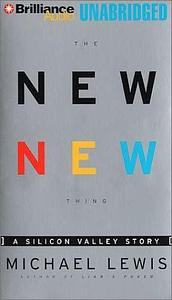Take a photo of a barcode or cover
informative
medium-paced
I wanted to like this book more than I did. I don’t know if I didn’t care about the subject matter or if the material seemed dated but I found myself just not caring much about the topic. A rich eccentric man and how he makes lots of money. The reckless nature of how he changed the economy does not make me feel any better and in a way paved the way for the Theranos and Sam Bankman-Frieds of the world.
An interesting look at one of the huge personalities who made the Internet thing happen. Of course, from this distance, it's mostly interesting because it's hard to remember the last time I heard anyone mention Jim Clark.
And I think Lewis really wanted to write a long magazine piece, then thought, "Hey, I bet with a little stretching, I can turn this into a short book that repeats itself a little too often."
Still, entertaining enough. But you're not missing much.
And I think Lewis really wanted to write a long magazine piece, then thought, "Hey, I bet with a little stretching, I can turn this into a short book that repeats itself a little too often."
Still, entertaining enough. But you're not missing much.
informative
reflective
medium-paced
adventurous
funny
informative
medium-paced
informative
slow-paced
I'm not sure why I finished this book. The writing was good, but I hated Jim Clarke towards the end. He just seemed like a typical entitled, money driven, full of himself, out-of-touch-with reality founder from Silicon Valley.
If your only value is money, then this story is an inspiration. But other than that, I had no regard for Jim's careless character.
If anything, it was a good history lesson for me because I was born in the '90's and had never heard of his companies. But they were critical to formation of the internet.
If your only value is money, then this story is an inspiration. But other than that, I had no regard for Jim's careless character.
If anything, it was a good history lesson for me because I was born in the '90's and had never heard of his companies. But they were critical to formation of the internet.
fast-paced
adventurous
informative
fast-paced
informative
The New New Thing by Michael Lewis is Lewis' take on Silicon Valley in the time around the end of the millennium. Lewis briefly explains the development of Silicon Valley but the book is mostly about one person, Jim Clark, and the book focuses on the story of Jim Clark. Jim Clark is the founder of Silicon Graphics, Netscape and Healtheon. All of these companies were billion dollar companies and Lewis tries to explain what drives a man to create three billion dollar companies and the changes that these companies brought to Silicon Valley.
I quite like some aspects of this book. What I found interesting was how the transition of Silicon Valley as a place for production of computers and electronics to a place of software and innovation was described. I particularly liked the analysis of how innovation in software changed how venture capitalists would work.
Unfortunately that is also the extent of what I liked about the book. I found it a bit lacking in focus of trying to tackle both a biography of Jim Clark and Silicon Valley simultaneously. The back and forth between the two narratives I found to be really distracting. Most of the time Lewis spends way too much time painting the picture for situations that are then not used to its full effect. This is most notable whenever he describes the scenes on Clark's boat.
Another thing I found lacking was the extreme one-sided view that is presented in the book. Lewis was of course placed in one side of the internet revolution - by virtue of following Clark and this means that many of the things that Lewis handles is only seen from the point of view of Clark.
Overall I think that the book really shines in a few chapters but the rest of it is not really worth reading. If you are interested in the early days of the Internet it might be worth a read but prepare to read a very one-sided and poorly nuanced take on it.
I quite like some aspects of this book. What I found interesting was how the transition of Silicon Valley as a place for production of computers and electronics to a place of software and innovation was described. I particularly liked the analysis of how innovation in software changed how venture capitalists would work.
Unfortunately that is also the extent of what I liked about the book. I found it a bit lacking in focus of trying to tackle both a biography of Jim Clark and Silicon Valley simultaneously. The back and forth between the two narratives I found to be really distracting. Most of the time Lewis spends way too much time painting the picture for situations that are then not used to its full effect. This is most notable whenever he describes the scenes on Clark's boat.
Another thing I found lacking was the extreme one-sided view that is presented in the book. Lewis was of course placed in one side of the internet revolution - by virtue of following Clark and this means that many of the things that Lewis handles is only seen from the point of view of Clark.
Overall I think that the book really shines in a few chapters but the rest of it is not really worth reading. If you are interested in the early days of the Internet it might be worth a read but prepare to read a very one-sided and poorly nuanced take on it.



